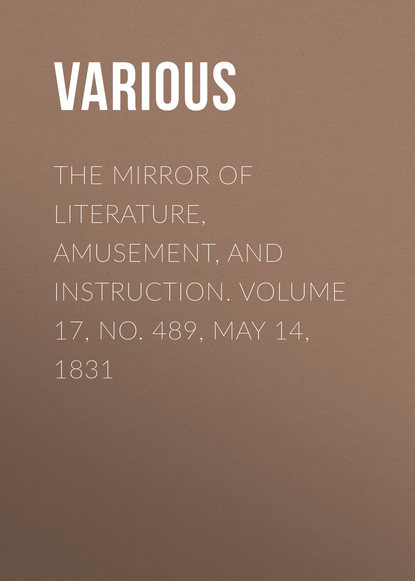 Полная версия
Полная версияThe Mirror of Literature, Amusement, and Instruction. Volume 17, No. 489, May 14, 1831
The Editor's Conclusion, or Summary of the Year is likewise worthy of extract:
"The curtain of the year 1830 dropped on Europe in a state of ferment and agitation, of which it was impossible to check the progress or to foretell the result. The masses of the population had been stirred up from the bottom by the concussion of the French and Belgic revolutions, and could not be expected for a long time to subside into order, or resume a determinate arrangement according to their weight and affinities. The partition wall of privilege, rank, or subordination, interposed between different classes of the European community, had in some cases been forcibly broken down, and in others had been more silently undermined. Antiquity, custom, usage, or legitimacy, which formerly became a shelter to abuses, could not now protect justice and right from threatened innovation. Everywhere power was challenged on its rounds, and compelled to give the popular watchword before it could be allowed to pass. Whether it was a nation that demanded its independence from a foreign power, as in Belgium and Poland; or a people that cashiered their dynasty, as in France and Saxony; or a parliament that changed its administration for a more popular party, as in England; or republics that liberalized their institutions, as in Switzerland,—all was movement and change. The breath of revolution sometimes blew from the suburbs of a capital, as in France; sometimes from the cottages of the peasant, as in the Swiss mountains; but it was every where powerful. No institution was held venerable, no authority sacred, that stood in the way of the popular will. The people had every where got a purchase against their rulers, and had fixed their engines for a further pull. The power of domestic military protection had diminished, in proportion as rulers required its aid; while, at the same time, all Europe seemed arming for a general trial of strength, or a recommencement of conquest. Every kind of reform was the order of the day; financial reform, legal reform, ecclesiastical reform, and parliamentary reform. The year that has just commenced must resolve the character of many of those vague tendencies to change, to war, and confusion, which alarmed some and inspired hope into others at the close of 1830."
NOTES OF A READER
THE DRAMATIC ANNUAL
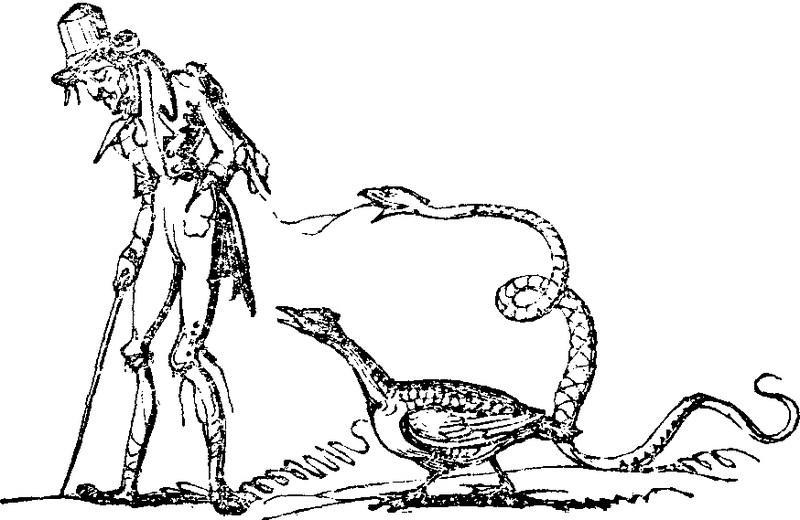
THE DAMNED AUTHOR.Mr Frederick Reynolds, the veteran dramatist, has, by the aid of Mr. W.H. Brooke, produced an amusing and elegant volume of a Playwright's Adventures, under the above title, Mr. Brooke's contributions are a plentiful sprinkling of Cuts, full of point and humour, and dovetailed by the Editor with no lack of ingenuity. The Narrative itself purports to be a series of adventures, or a volume of accidents to a young playwright in quest of dramatic fortune, with a due admixture of love and murder, and "a happy union."—These are relieved by pungent attempts at repartee and harmless raillery, so as to make the dialogue portion glide off pleasantly enough. Instead of quoting an entire chapter from the volume, we are enabled to transfer to our pages a few of its epigrammatic illustrations. First, is what Mr. Reynold calls l'auteur sifflè, but this, for the sake of comprehensiveness, we style the damned author.
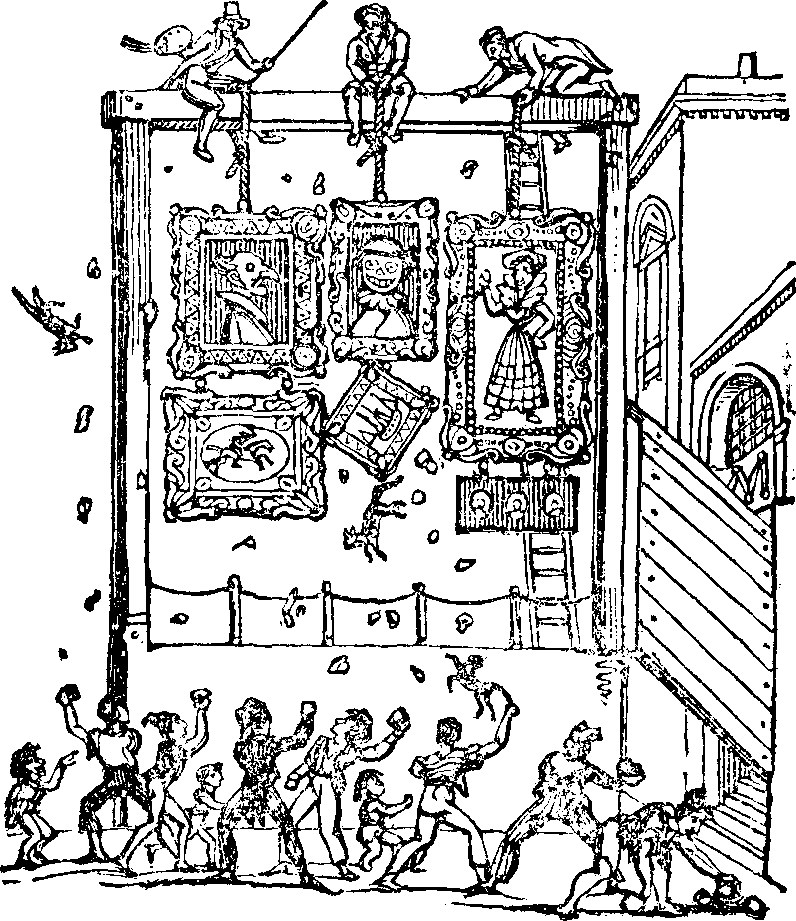
THE HANGING COMMITTEE.Mr. Reynolds seems to hold with Swift, that the merriest faces are in mourning coaches, for his hero at a funeral introduces one of the best cuts. Thus—
On Vivid's return home, his gratification was soon diminished by the recollections of "existing circumstances," and these caused him to sink into a gloomy and desponding state; when Sam Alltact, rather malapropos, entered with a black-edged card, inviting his master to the funeral of a deceased acquaintance, an eminent young artist, named Gilmaurs, who, never having been an R.A., but simply an engraver of extraordinary genius, was not to be buried under the dome of St. Paul's, but in a village churchyard.
Vivid could not help remarking to a brother mourner, that, in his opinion, the profession of a painter was as much overrated as that of an engraver was underrated: "for," he added, "what real and unprejudiced connoisseur, while contemplating Woollett's Roman Edifices from Claude, and Sir Robert Strange's Titian's Mistress from Titian, with many others, would not acknowledge, that the copy in many instances so rivalled, if not surpassed, the original, that it became a decided question, which artist ought to carry off the palm?"
"Or, at any rate," cried an odd accordant theatrical companion, "the connoisseur might say, with Shakspeare—
'Which is the merchant here, and which the Jew?'""There is no doubt, that in any school of painting," continued our hero, "such men as Reynolds, West, and Lawrence, cannot be too much upheld whilst living or lauded and regretted when dead. There is likewise Wilkie—another Hogarth–"
"I beg your pardon," rejoined the theatrical gentleman; "but till I can forget the blunderbuss fired from the upsetting coach, the cobweb over the poor's-box, and the gay parson and undertaker at the harlot's funeral, I cannot allow of the comparison. Besides, I admire Hogarth for another reason: did he consider an engraver's to be an infradig. profession? No, for he was the engraver of his own works."
"True," replied Vivid; "and other painters have been engravers. But to the point: look at the variety of the exquisite engravings in the Annuals; and having compared them with the large, coarse, mindless pictures in—what may be called another annual—the Exhibition of the Royal Academy, then say, whether you do not prefer the distinct delicate touches of a well-directed burin, to the broad, trowel-like splashings of an ill-directed painting-brush?"
"I do; and whilst I bow down to the excellence of such a portrait as that of Charles the First, by Vandyke, or that of Robin Goodfellow, by Sir Joshua, cum multis aliis by painters of the same pre-eminent description—ay, and also whilst I greatly admire numerous pictures still annually exhibited by highly talented living artists, I ask, if I am not to speak my mind relative to that class of painting, which might pass muster outside the inns at Dartford, or Hounslow, or –. However, 'the lion preys not upon carcasses,' and, therefore, I will leave these canvass-spoilers to the judgment of those, who will show them in their proper light—viz. the hanging-committee."
The funeral being concluded, they return to town, Vivid agreeing with his odd companion in leaving the canvass-spoilers to the hanging committee.
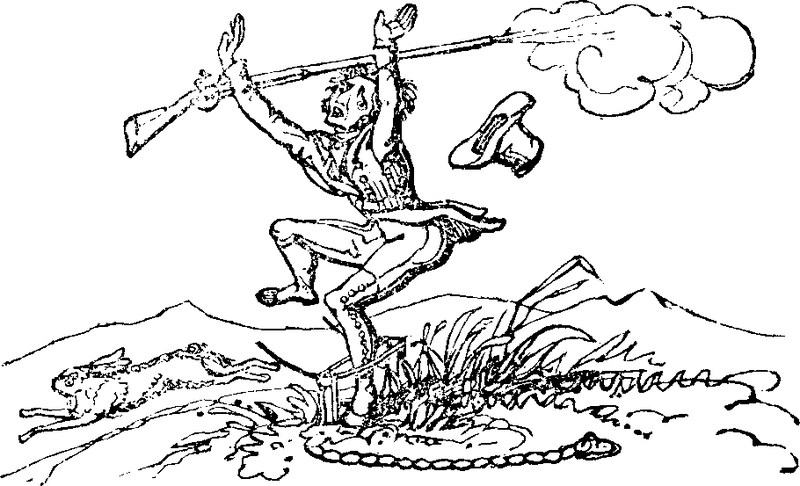
Is it not to be hoped that a day may come when a thorough revision and amelioration of our equity laws will be deemed a matter of as great national importance as that chief occupier of the time of our grand rural Capulets and Montagues, the revision and amelioration of the game laws.
TRIAL BY BATTLE
"Ay, leave lawyers to wrangle amongst each other—a practice which of late years has become so much a legal fashion, that some of our Westminster Hall heroes, forgetting their clients' quarrels in their own, suddenly convert themselves into a new plaintiff and defendant, and brawl forth such home coarse vituperations–"
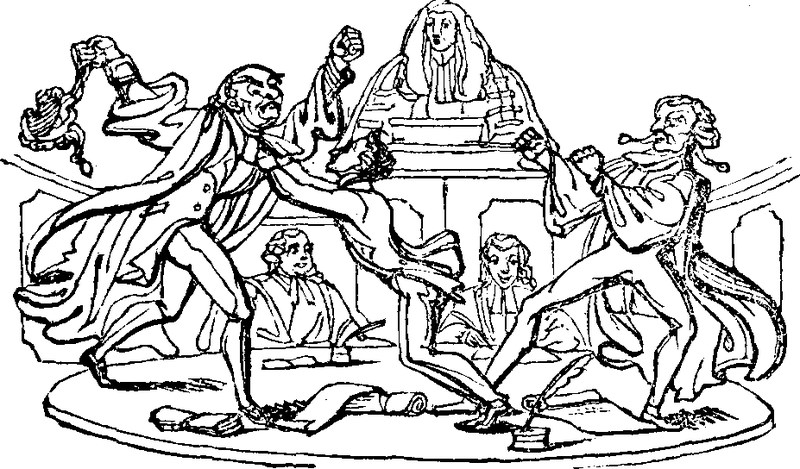
"True;—formerly they used to brow-beat witnesses, now they brow-beat one another, and so defyingly, that ere long, who knows but the four courts may resemble, as punsters would say, the five courts?"
KICKING THE WORLD
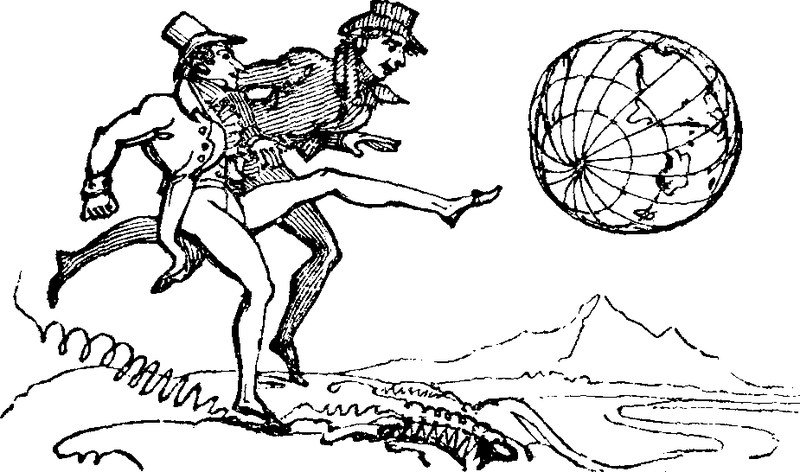
Every one has heard of kicking the world before them, though, comparatively, so few succeed in the task. The wights in the cut are in an enviable condition.
A sketch of one of those inveterate story tellers which are the standing dishes of a table d'hôte, introduces one of the best of the cuts, Mr. Blase Bronzely, loquitur:
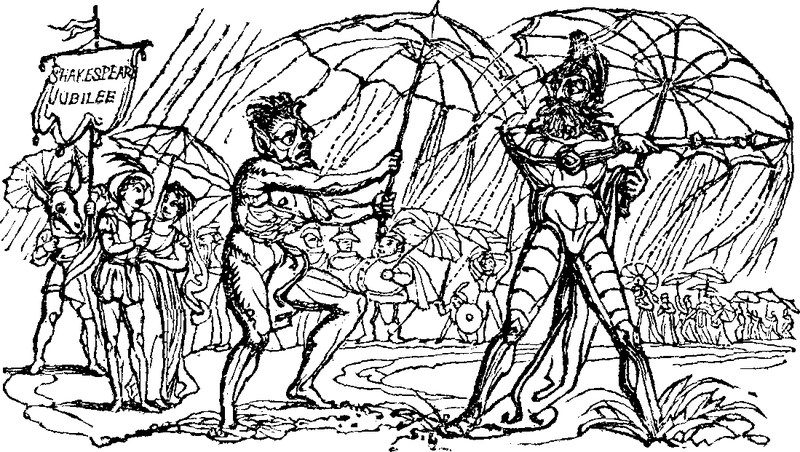
"Well, gentlemen, as I was saying, when I saw at Stratford-upon-Avon the Shakspearean procession pass in the street, it rained so violently that Caliban and Hamlet's Ghost carried umbrellas, whilst Ophelia–"
"Obvious, my dear Blase; or, as a late premier used to say, 'It can't be missed,' 'Too much of water hast thou, poor Ophelia:' and, besides, your wet ghost is a mere crib from yourself; for whenever you go hunting in cloudy weather, don't you regularly ride with a smart silver parasol over your dear little head?"
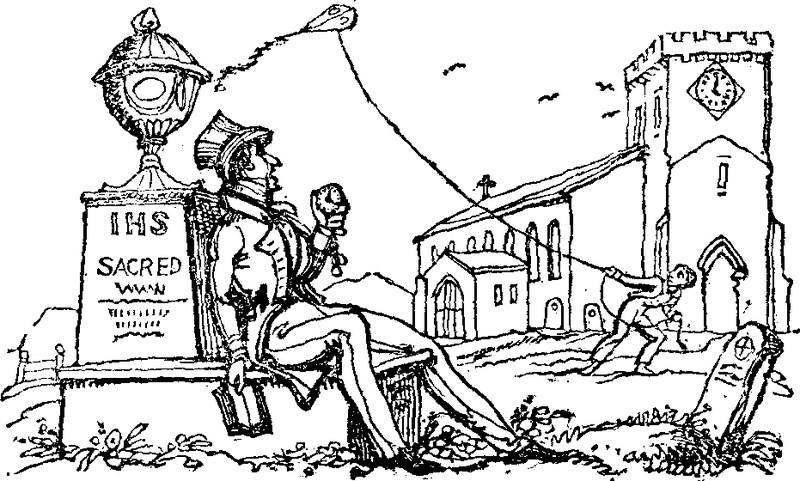
A SEA-SIDE TIME-KILLER–(DOVER.)Soon growing tired of lounging in the library, loitering on the pier, and of all the rest of the usual dull sea-side routine, he literally knew so little what to do with himself, that, to kill an hour or two before dinner, he would frequently be seen seated on a tombstone in the churchyard, yawning; staring at the church clock, and comparing it with his own watch;—in short, in some degree resembling
"Patience on a monument."The reader will conclude by these specimens that fun and frolic are the characteristics of the Dramatic Annual; and we have given him a spice of its best humour. These Cuts, by the way, are in a style which all illustrators would do well to cultivate. We have seen much labour expended on illustrations of works of humour, such as fine etchy work, and points wrought up with extreme delicacy. The effect, however, is any but humorous: you think of painstaking and trouble, whereas a few lines vividly dashed off, by their unstudied style, will ensure a laugh, where more elaborate productions only remind us of effort. Hood's pen-and-ink cuts are excellent in their way—as bits of fun, but not of art. Now, Brooke's designs are both works of fun and art.
THE FAMILY CABINET ATLAS
Is completed with the Twelfth Part, in the same style of excellence as it was commenced. In this portion are two plates, exhibiting a comparative view of Inland Seas and Principal Lakes of the Eastern and Western Hemispheres—which alone are worth the price of the Part. Altogether, the uniformity and elegance of this work reflect high credit on the taste and talent of every one concerned in its production; and it really deserves a place on every writing-table not already provided with an Atlas. For constant reference, too, it is well calculated, by its convenient size, and is preferable to the cumbrous folio, as well as the varnished, rustling, roller map.
THE KING'S SECRET
Hundreds of persons have probably been disappointed by this work—an historical novel, of the time of Edward the Third, by Mr. Power, of Covent Garden Theatre. Scandal-loving people are so fond of concatenation, or stringing circumstances, causes, and effects together, that in the present case they made up their minds to some secret of our times: some boudoir story of Windsor or St. James's, which might show how royalty loves. On the contrary, "the secret" does not come out;—the reader is only tickled, his curiosity excited, and the tale, like an ill-going clock, is wound up without striking.
We attempt something like an outline of the plot, although it is just to induce Our reader to turn to the work itself, for we foretel he will be pleased with its details. Artevelde, a beer brewster of Ghent, intrigues with Edward to transfer the coronet of Flanders from Count Lewis to the young Prince of Wales. The scheme fails, and Artevelde perishes in an affray with the citizens In his negotiations he had employed his daughter, and dispatched her on one occasion, in a private yacht, to the Thames, to confer with the King. In her passage she is observed and recognised by the follower of a Flemish noble, who has a direct interest in defeating Artevelde's scheme for the marriage and settlement of his daughter, who, before she reaches the King, is seized by this noble and his agents, but is rescued by a brave young citizen. Here the love begins. This young citizen is the nephew of a wealthy old goldsmith, but he abominates the traffic and filthy lucre of his uncle's profession—for, it should be added, the goldsmiths were the money-jobbers of those days—and aspires to become a soldier of fortune. London was a fitting place for such ambition, for those were chivalrous times. Artevelde's daughter entrusts the youth with the commission, and dispatches him to the King: he acquits himself with courtly discretion, and, having displayed some prowess in a passage of arms, soon obtains an appointment in the royal service. Edward's interview with the lady determines him to start instantly for Flanders, and the young citizen (Borgia) accompanies him. They fall into the hands of the same Flemish noble who had attacked the heroine; but they are rescued, and land at the Flemish coast.—The scheme fails, as we have said: after Artevelde's death, his daughter becomes the King's ward. The interests of the parties now become too complicated for us to follow: we may, however, state that "the King's Secret" is the parentage of Borgia; it was asserted that he was "the very child reported to have been born during the period of Queen Isabella's romantic love passages with Roger Mortimer, at the court of Hainault."—"Be content, therefore, with that you and til here already are possessed of, since what remains is, and must continue, 'The King's Secret.'"
The heroine is the gemmy character of the story; but, in that of the King so much license has been used as almost to defy its identification with history. Scenes, situations, and sketches, of uncommon interest, abound throughout the work; the manners and customs of the times, and the details of costume and pageant glitter are worked up with great labour—perhaps with more than is looked for or will be appreciated in a novel. Still, they are creditable to the taste and research of the author. Occasionally, there are scenes of bold and stirring interest, just such as might be expected from an actor of Mr. Power's vivid stamp. The storm sketches towards the close of the second volume are even infinitely better than any of John Kemble's shilling waves or Mr. Farley's last scenes. In other portions of the work, bits of antiquarianism are so stuck on the pages as to perplex, rather than aid the descriptions, by their technicality. Here and there too the tinsel is unsparingly sprinkled.
Nevertheless, there is a vividness—a freshness—and altogether a superior interest, in all the details which must render "The King's Secret" a favourite work with the fiction-and-fact-reading public. The scenes are so complicated in their interest, that it is scarcely possible to detach an extract.
In the early part of the first volume occurs a passage relative to the resistance of the people of Ghent to the oppression of their rulers, which smacks strongly of the enthusiasm of liberty.
"Whilst impelled on the one hand by the strong desire to regulate the arbitrary and oppressive exactions, which cramped their energies and held them for ever at the mercy of their despot's caprice, and restrained on the other hand by their habitual reverence for their feudal princes. Artevelde stepped forth, and in their startled ears pronounced the word "Resist!" His eloquence was well seconded by the grasping severity of a needy and extravagant court, until gradually combining their wrath and intelligence with the energies of the populace jealous of their rights, the merchants and citizens of the cities of Flanders rose upon the bears and butterflies who infested and robbed them, and, thrusting them forth, set modern Europe the first fearful example of a people's strength, and the rottenness of the wooden gods for whom they laboured. Whilst princes, on their parts, learned a lesson they have not since forgotten or ever ceased to practise, and combining their hosts of slaves, lashed them onward to scare this stranger, Freedom, from the earth, even as in our times of intelligence they have done, and will do; and the brainless slaves, so lashed, shouted and went forward to the murderous work which rivetted their own fetters, even as in our time they have done, and will again do in times to come."
SPIRIT OF THE PUBLIC JOURNALS
TWENTY YEARS
BY THOMAS HAYNES BAYLYThey tell me twenty years are pastSince I have look'd upon thee last,And thought thee fairest of the fair,With thy sylph-like form and light-brown hair!I can remember every wordThat from those smiling lips I heard:Oh! how little it appearsLike the lapse of twenty years.Thou art changed! in thee I findBeauty of another kind;Those rich curls lie on thy browIn a darker cluster now;And the sylph hath given placeTo the matron's form of grace.—Yet how little it appearsLike the lapse of twenty years.Still thy cheek is round and fair;'Mid thy curls not one grey hair;Not one lurking sorrow liesIn the lustre of those eyes:Thou hast felt, since last we met,No affliction, no regret!Wonderful! to shed no tearsIn the lapse of twenty years.But what means that changing brow?Tears are in those dark eyes now!Have my rush, incautious wordsWaken'd Feeling's slumbering chords?Wherefore dost thou bid me lookAt you dark-bound journal book?—There the register appearsOf the lapse of twenty years.Thou hast been a happy bride,Kneeling by a lover's side;And unclouded was thy life,As his loved and loving wife;—Thou hast worn the garb of gloom,Kneeling by that husband's tomb;—Thou hast wept a widow's tearsIn the lapse of twenty years.Oh! I see my error now,To suppose, in cheek and brow,Strangers may presume to findTreasured secrets of the mind:There fond Memory still will keepHer vigil, when she seems to sleep;Though composure re-appearsIn the lapse of twenty years.Where's the hope that can abateThe grief of hearts thus desolateThat can Youth's keenest pangs assuage,And mitigate the gloom of Age?Religion bids the tempest cease,And, leads her to a port of peace;And on, the lonely pilot steersThrough the lapse of future years.New Monthly MagazineMEMOIRS OF THE MACAW OF A LADY OF QUALITY
By Lady Morgan(Continued from page 318)Meantime Father Flynn, with a Jesuit's adroitness, was endeavouring to gain his object, as I afterwards learned; but on alluding to his works and celebrity, he discovered that the ambassador had never so much as heard of him, though he had heard wonders of his parrot, which he requested might be sent for. I was immediately ushered into the cabinet, as the superior went out, and I never saw my dear master more. Perhaps he could "bear no rival near the throne;" perhaps, in his preoccupation, he forgot to reclaim me. Be that as it may, he sailed that night, in a Portuguese merchantman, for Lisbon; and I became the property of the representative of his British Majesty. After the first few days of favouritism, I sensibly lost ground with his excellency; for he was too deeply occupied, and had too many resources of his own, to find his amusement in my society. During the few days I sat at his table, I entertained his diplomatic guests with cracking nuts, extracting the kernels, peeling oranges, talking broad Scotch and Parisian French, chanting the "Gloria," dancing "Gai Coco," and, in fact, exhibiting all my accomplishments. I was, however, soon sent to the secretary's office to be taught a new jargon, and to be subjected to tricks from the underlings of the embassy.
Here I picked up but little, for there was but little to pick up. I learned, however, to call for "Red tape and sealing-wax"—to cry "What a bore!" "Did you ever see such a quiz?"—to call "Lord Charles," "Mr. Henry," and pronounce "good for nothing"—a remark applied by the young men to the pens, which they flung away by hundreds, and which the servants picked up and sold, with other perquisites of office incidental to their calling. Whenever I applied these acquisitions with effect, it was always attributed to chance; but I was so tormented and persecuted by Lord Charles and Mr. Henry, who being unpaid attachés, had nothing to do, and helped each other to do it, that I took every opportunity to annoy them. One day, when the ante-room was filled with young officers of the British frigate, one of the boobies, pointing to Lord Charles, called to me, "Poll, who is that?" I answered, "Red tape and sealing-wax;" and raised a general shout at the expense of the little diplomatic pedant. An Irish midshipman present, a Mr. O'Gallagher, pointing to Mr. Henry, asked me, "Who is that, Poll?" "Good for nothing," I replied; and Mr. Henry flew at me in a rage, swore I had been taught to insult him, and that he would wring my neck off. This he would have done but for the protection of the chaplain, to whose breast I flew, and who carried me away to his own room. In a few days I was consigned to Mr. O'Gallagher, the midshipman, as a present to the chaplain's patroness, a lady of high rank and celebrated sanctity in Ireland, near to whose Propaganda the family of O'Gallagher resided. I was the bearer of a letter of introduction, in which my pious education and saintly acquirements were set forth, my knowledge of the Creed exposed, and myself recommended as a means of aiding her ladyship's proselyting vocation, as animals of less intelligence had done before. I embarked therefore on board the British frigate—an honour which had been refused my old master, and was treated with great care and attention during the voyage. On arriving in a British port, my young protector got leave of absence, and took a passage in a vessel bound for Dublin. On the morning of our coming to anchor, my cage was put on shore on the quay, while O'Gallagher returned to look after his luggage. Thus left to myself, I soon attracted the attention of a wretched, squalid-looking animal, something between a scare-crow and a long-armed gibbon. His melancholy visage dilated into a broad grin the moment he saw me; and coming up, and making me a bow, he said, "Ah! thin, Poll, agrah, you're welcome to ould Ireland. Would you take a taste of potato, just to cure your say-sickness?" and he put a cold potato into my cage, which he had been gnawing with avidity himself. The potato was among the first articles of my food in my native paradise, and the recollection of it awakened associations which softened me towards the poor, hospitable creature who presented it. Still I hesitated, till he said, "Take it, Miss, and a thousand welcomes,—take it, agrah, from poor Pat." I took it with infinite delight; and holding it in my claws, and peeling it with my beak, began to mutter "Poor Pat! poor Pat!" "Oh, musha, musha! oh, by the powers!" He cried, "but that's a great bird, any how—just like a Christian—look here, boys." A crowd now gathered round my cage, and several exclamations, which recalled my old friends of the Propaganda, caught my attention. "Oh! queen of glory!" cried one; "Holy Moses!" exclaimed another; "Blessed rosary!" said a third. I turned my head from side to side, listening; and excited by the excitement I caused, I recited several scraps of litanies in good Latinity,—There was first an universal silence, then an universal shout, and a general cry of "A miracle! a miracle!" "Go to Father Murphy," said one; "Off with ye, ye sowl, to the Counsellor," said a second; "Bring the baccah to him," cried an old woman; "Mrs. Carey, where is your blind son?" said a young one. Could faith have sufficed, I should indeed have worked miracles. In the midst of my triumphs, Mr. O'Gallagher returned, carried me off, put me in a carriage, and drove away, followed by the shouting multitude.—That night we put up at an hotel in Sackville-street, and the next morning the street re-echoed with cries of "Here is a full account of the miraculous parrot just arrived in the city of Dublin, with a list of his wonderful cures, for the small charge of one halfpenny." Shortly after we set off by the Ballydangan heavy fly, for Sourcraut Hall. I was placed on the top of the coach, to the delight of the outside passengers; where I soon made an acquaintance with the customary oratory of guards and coachmen, which produced much laughter. I rapidly added to my vocabulary many curious phrases, among which the most distinct were—"Aisy, now, aisy," "Get along out of that," "All's right," &c. &c. &c. with nearly a verse of "The night before Larry was stretched," tune and all, and the air of "Polly put the kettle on," which the guard was practising on his bugle, to relieve the tedium of the journey. Like all nervous animals, I am extremely susceptible to external impressions; and the fresh air, movement, and company, had all their usual exhilarating effects on my spirits. Our lady of Sourcraut Hall, Lady C–, received myself and my protector with a ceremonious and freezing politeness; asked a few questions concerning my treatment, gentleness, and docility; and desiring my kind companion to put me on the back of a chair, she bowed him out of the room. When he was gone, the lady turned to a gloomy-looking man, who sat reading at a table, and who looked so like one of the Portuguese brothers of the Propaganda, that I took him for a frate—"What a poor benighted creature that young man seems to be!" she said. The grave gentleman, who I afterwards found was known in the neighbourhood by the title of her ladyship's "moral agent," replied, "What, madam, would you have of an O'Gallagher—a family of the blackest Papists in the county?" My lady shook her head, and threw up her devout eyes.—Dinner was now announced, and the moral agent giving his hand to the lady, I was left to sleep away the fatigue of my journey.



